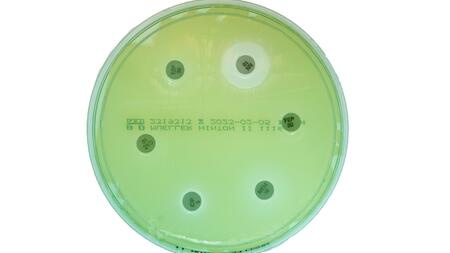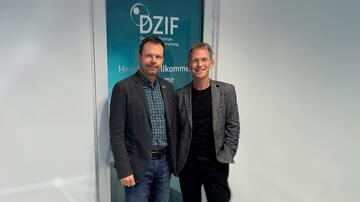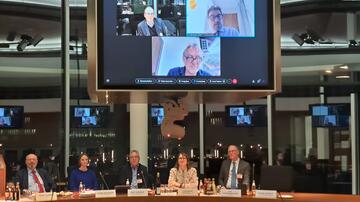Are optimised natural products the key to treatment in chronic lung disease?
Antibiotics are increasingly failing to work. Even new drugs are often ineffective in treating infections caused by gram-negative pathogens such as Pseudomonas aeruginosa, a relevant causative agent of pneumonia. A research team from the Justus Liebig University (JLU) and Fraunhofer Institute for Molecular Biology and Applied Ecology (IME) Giessen, LMU University Hospital Munich and the German Center for Infection Research (DZIF) has now succeeded in developing a novel antibiotic that specifically attacks gram-negative pathogens. The substances are active against multidrug-resistant Pseudomonas strains.
As part of the current study, the team of natural product researchers at the Institute of Insect Biotechnology at JLU and the Fraunhofer IME in Giessen, led by Prof. Till Schäberle, has further optimised the natural product class of darobactins, which they helped to discover in 2019. "These are novel peptides that attack gram-negative bacteria at a previously clinically unused site of action," explains Prof. Schäberle. "So far, the darobactins, with very good antimicrobial activity in vivo, show no cell toxicity—a core requirement for use as antibiotics," Schäberle continues. Biotechnological work in the field of natural product research has improved the production of this substance. Above all, it has now been possible to generate new analogues.
The researchers in Giessen developed a biotechnological platform to produce the substances from the natural substance class of darobactins and modify them accordingly. They optimised the substances and tested the molecules together with a team of scientists of the Dr. von Haunerschen Children's Hospital at the LMU University Hospital Munich against multidrug-resistant pathogens originating from patients with cystic fibrosis.
Dr Ulrich von Both, paediatric infectiologist and scientist at LMU University Hospital Munich, is looking for new treatment options for patients, some of whom are critically ill. He explains: "Only the last reserve antibiotics are effective against multidrug-resistant gram-negative (MRGN) pathogens. Especially in the important supportive antibiotic treatment of cystic fibrosis, this often means a significantly increased risk of toxic side effects for patients." The newly published research results could be an important step that offers hope in the long term for successful treatment of patients with cystic fibrosis as well, von Both further explains. Cystic fibrosis, also known as mucoviscidosis, is a congenital metabolic disorder and one of the most common hereditary diseases.
The two leaders of the study, Dr Ulrich von Both and Prof. Till Schäberle, are scientists at the German Center for Infection Research (DZIF) partner sites in Munich and Giessen, respectively. They unanimously emphasise that antibiotics should be used carefully to preserve treatment options against serious bacterial infections in the long term. New, effective antibiotics against MRGN pathogens are urgently needed. In particular, molecules with a new mechanism of action, such as the "frontrunners" tested here, must be developed as quickly as possible into operational life-saving antibiotics.
Source: Press release (in German) of the Justus Liebig University Giessen




